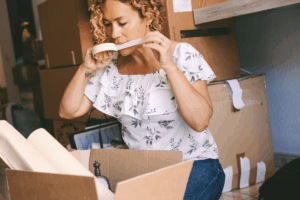Home » Customer » Financial Wellbeing Hub » Priority Debt
FINANCIAL WELLBEING HUB
Your guide to Priority Debts

FINANCIAL WELLBEING
We understand how easy it can be to get overwhelmed with debt problems. So we’re here to help you plot a course through them. By providing you with crucial information, along with advice to help you organise and manage your commitments, you’ll soon have a better understanding of how to look forward with renewed optimism.
The most important rule of all to stick to is this. If you’re unable to pay all of your debts, don’t ignore them. And don’t simply pay the ones who call more often or send the most letters. Instead, you need to make a plan – and that starts with prioritising.
Some debts have serious consequences for not paying. So if you’re struggling, split all of yours into three clear groups:
- Debt emergencies
- Priority debts
- Non-priority debts
As you’d imagine, these are the most critical, time-sensitive debts to resolve. And the consequences of not dealing with them can be severe. But there are ways and means of regaining some control.
Debt emergencies include the following:
- Going to court
- Bailiffs visiting
- Services being disconnected
- Being evicted for mortgage or rent arrears


Are any of these happening to you? If so, we urge you to seek free, independent debt advice urgently. Citizens Advice has trained advisers who can help you.
If you’ve been summoned to court, make sure you turn up to any hearing you’re told to attend. If you’re there, you can tell the court about your situation. And this might help them reach a decision that’s better for you. If you don’t go, they may decide without considering your circumstances.
And if you’re due in court in the next 24 hours, ask if there’s someone you can speak to before your case is heard. Some courts work with charities like Citizens Advice or Shelter, who can give you last-minute support.
Priority debts
These don’t have to be the biggest bills. Or those with the most expensive interest rates. But not paying them can impact your home and health, cause legal problems and lead to more debt.
If you’re feeling unsure what your priority debts could be, common ones include your mortgage or rent, energy bills and Council Tax.

It’s worth stating that these are worst-case scenarios, not certainties. But it’s possible that you could:
- lose your home (not keeping up with mortgage or rent payments)
- have your heating or lighting cut off (unpaid bills)
- be visited by bailiffs or debt collectors
- receive a court summons
- have money taken from your wages or benefits
- be made bankrupt (unpaid bills)
- face prison (unpaid criminal fines or maintenance, or even your Council Tax)
We want you to understand exactly what priority debts are. So here’s a definitive list of them, including the consequences for not paying in England and Wales.
Want to know which option is best for you? There are many things to take into account – the table below can tell you more
Priority Debt: | If you don’t pay: |
|---|---|
Mortgage | ● You could lose your home or the property with a mortgage |
Secured loan | ● You could lose your home |
Gas or Electricity | ● Your supply can be cut off ● You could be forced to have a pre-payment meter ● Money could be taken from your benefits |
Council Tax | ● Money could be taken from your bank account and/or benefits ● Bailiffs could visit ● The debt could be secured against your home ● The local council could apply to make you bankrupt ● You risk prison (in England, not Wales) |
Child Maintenance | ● Money could be taken from your bank account and/or benefits ● Bailiffs could visit ● You could get a court order to sell your belongings ● A court order could also force you to sell your home ● You could lose your driving licence or passport ● You risk prison |
County Court Judgement (CCJ) | ● Bailiffs could visit ● The people you owe money to could apply for a charging order (securing the debt against your home) ● Money could be taken from your wages and/or bank account |
Hire Purchase or Logbook Loan (CCJ) | ● Your belongings could be taken ● Those you owe money to could apply for a CCJ |
Magistrates Court Fines (CCJ) | ● Bailiffs could visit ● Money could be taken from your bank account and/or benefits ● You risk prison |
Phone (CCJ) | ● Your service could be cut off ● The phone company could apply for a CCJ |
Rent | ● You could be evicted from your home |
Tax, VAT or National Insurance | ● Money could be taken from your wages ● Bailiffs could visit ● His Majesty’s Revenue & Customs (HMRC) could apply to make you bankrupt ● HMRC could apply for a CCJ |
TV Licence | ● Money could be taken from your wages ● Bailiffs could visit ● His Majesty’s Revenue & Customs (HMRC) could apply to make you bankrupt ● HMRC could apply for a CCJ |
Unlike the other types we’ve already covered, this third debt type differs in that those you owe money to don’t have the same strong powers to act against you. They have to get a CCJ before taking any legal action.
Despite this, it’s important to know that you can still be taken to court, and bailiffs can still visit, if you don’t pay your non-priority debts.
These include:
- Charge cards
- Credit cards
- Mail order catalogues
- Money lenders
- Store cards
- Unsecured bank loans
- Unsecured overdrafts
- Water arrears

A guide to Priority Debts
We understand it can be overwhelming to know which debts to Prioritise, which is why we’ve created this little guide to help you. Our guide will help navigate which debts you should focus on.
By now, you should have a firmer grasp of different debt types and how to prioritise them. The next step is to put the wheels in motion for paying back those you owe money to. These are your creditors.
To help put some structure behind how to approach this, we suggest you follow this five-step plan:
Before you start, find your most recent:
- bank statements
- payslips
- debit and credit card statements and bills
- receipts for anything you pay for in cash
Use an online budgeting tool, and try to be as accurate as you can. Budgeting will tell you how much you have left each month, after paying your essential bills and priority debts.
How much you should pay each creditor depends on the amount you owe. So if you owe £1,000 in Council Tax and £2,000 on your mortgage, you owe twice as much on the mortgage as you do the Council Tax. This means your offer to the mortgage provider should be twice as much.
This is called a ‘pro rata’ offer and means you’ll treat all your creditors equally. You’ll need to make sure your offers are pro rata, or they may be refused.
Doing this means you’ll know whether you have anything left for non-priority debts – and how much.
You should contact the people you have priority debt with as soon as possible. Explain why you’re in debt. For example, because you’ve lost your job. Say that you’re sorting out the situation and tell them how much you can afford to pay each week or month, and how quickly.
Send them a copy of your budget. This shows that what you’re offering to pay is fair. And don’t forget to ask them to freeze any interest and charges as long as you continue to pay the amounts you’re suggesting.

Do this as soon as you can, even before creditors have said whether they’ll accept your offer. Sending payments can often help offers be accepted. Clear your priority debts as soon as possible, because of the serious consequences of not paying. Payments to priority debts should be higher than payments to non-priority debts.
You can make lower monthly repayments if you’re struggling to pay non-priority debts. But remember, paying less than the agreed amount can damage your credit score.
Tell your creditors you’re trying to sort out your debts. Ask them to stop asking you for payments while you work out what to do. You should also ask them to stop adding interest and charges so your debt doesn’t get any bigger. Citizens Advice has created a sample letter you can use.
Need more help?
ARTICLES & BLOGS
If you’d like to dig deeper, read our articles and blogs for the best Homeowner Loan content and insight.

Can you remortgage to buy another property?

Mortgages for pensioners: Can you get a mortgage at 65?

Should I use a mortgage broker or a bank?

How does buy to let work?

What is a buy to let mortgage in the UK?
